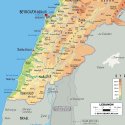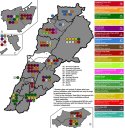Looking into the subject:
Another interesting aspect of this is how divided the Israeli military is over a war in the north. There is many in the Israeli officer class that fought in 2006 and want revenge for their loss. Since 2006 they keep saying they will unleash the total war on Lebanon. Then you have what is left of the rational military officers who see that the Israeli military has been attrited in Gaza and and warn a war with Hezbollah would cripple and destroy the military.
I'll quote my post 2 Nov 2023 and expand on it:
Is anyone outraged at all by the Israeli bombing of a refugee camp despite knowing full well that it was full of innocent civilians or wre the anglos and Israelis hoping the world will get so numb from helplessness that it’ll let Israel pull an Anglo and genocide Palestinians and steal their...
www.sinodefenceforum.com
This is a table I made that lists generations of soldiers, officers and generals serving in the IDF which should explain how institutional knowledge and culture is preserved and transmitted. I put in bold the generation which fought in first intifada for reference.
| conflict | start date | recruit date of birth
(18 y.o.) | officer date of birth
(36 y.o.) | general staff member date of birth (54 y.o.) |
| independence | 1948 | 1930 | 1912 | 1894 |
| six day | 1967 | 1949 | 1931 | 1913 |
| Yom Kippur | 1973 | 1955 | 1937 | 1919 |
| first Lebanon | 1982 | 1964 | 1946 | 1928 |
| first intifada | 1987 | 1969 | 1951 | 1934 |
| second intifada | 2000 | 1982 | 1964 | 1946 |
| second Lebanon | 2006 | 1988 | 1970 | 1952 |
| Protective Edge (Gaza) | 2014 | 1996 | 1978 | 1960 |
| Swords of Iron (Gaza) | 2023 | 2005 | 1987 | 1969 |
Yom Kippur war was IDF's peak of capabilities with generals having experience from 1948-1967, officers from 1967 and recruits coming from a well structured military system.
Currently IDF is in its entirety staffed by personnel that has no experience in full scale peer or near-peer conflict. The generals of general staff were recruits during the first intifada and
only the oldest military personnel (60+) were recruits during the 1982 invasion of Lebanon.
To emphasise - apart from those oldest officers who fought in Lebanon in 1982 nobody in the IDF has
direct experience of war on the level of platoon and below from any conflict before the 1st Intifada. It's not just junior officers:
nobody except those of 60-65 years of age.
The only military conflicts that IDF fought in since then are:
| year | location | period | duration [days] | max active forces committed |
| 2006 | Lebanon | 12.7.06-14.8.06 | 33 | 30 000 |
| 2008 | Gaza | 27.12.08-18.01.09 | 22 | 20 000 |
| 2012 | Gaza | 14.11.12-21.11.12 | 7 | 100 000 |
| 2014 | Gaza | 8.7.14-26.8.14 | 49 | 175 000 |
| 2023 | Gaza | 7.10.23-27.7.24 | 295 | 525 000 |
Which means that IDF's experience from a full scale conflict that will be relevant to (third) invasion of Lebanon is limited to what they gained in 2006 and that is in no means relevant to what they are likely to find in 2024.
Most importantly Hezbollah is a completely different formation compared to what it was in 2006 because it is one of the most consistently active participants in the full-scale conflict in Syria since 2011. In particular they're experienced in ground warfare of
regular and irregular infantry while IDF's experience is limited to airstrikes and special operations. Any invasion into Lebanon will involve regular infantry that could only gain experience in the most recent conflict since Oct 2023. Hezbollah has also gained experience in fighting in conditions of enemy technological superiority involving NATO and Russian aerial and electronic warfare so while they won't have any equalisers to IDF's advantage they have developed at least some solutions to counter or diminish the effectiveness of enemy systems and tactics.
Hezbollah's experience in using regular as well as irregular infantry will be invaluable because it will allow it to use a wider pool of personnel than just its core ranks. Likely they will use them much in the same manner that Russia uses its "tiers" of infantry - crude and inhumane but
effective esp. considering the resources available.
The region of South Lebanon that IDF would attempt to control isn't particularly difficult - the terrain is harsher on the Israeli side - but it's also not as open and clear as the area immediately around Gaza.
Topography will constrain IDF's movements and choices to what its ground component can cross and Hezbollah had time to prepare for that scenario.
Pay attention to the height scale (right) and distance scale (bottom left)
General map:

Detailed maps:


IDF is not an air-mobile formation because airmobile operations require much higher level of training than mechanised or motorised tactics - which is why e.g. Russia which relies on consripts (to lesser degree than IDF!) uses airmobile tactics with VDV and select battalions of Naval Infantry
only. It's safer to go in APCs untrained than to attempt airmobile operations where logistics and maneuver alone can cause dangerous complications even without enemy present.
Israel has only ~50 UH-60, ~25 CH-53 and ~45 AH-64. If we assume 1:3 rotation of equipment it leaves 16 medium, 8 heavy and 15 attack helicopters available for operations at any time which should be sufficient to support a
battalion of infantry.
IDF has a possible solution but it requires a pincer movement - one push along the coast and another along the Litani river - the one that is parallel to the border and close to the northernmost portion of Israeli territory.

Both axes have road networks supporting the maneuver and air force could clear the way for the pincer. The captured territory however is primarily Shia majority so the suppression would be just as costly as in Gaza. But that has been already tested in Gaza as well and will focus on bombing the area into rubble (with allied help) while IDF maintains a siege along the roads and naval blockade is in place.
This may be why IDF brass is pushing - but I'm speculating and assume competence, which is very generous. Of course that is "optimal" scenario and Israel may as well pull off a Putin and choose the worst solution.
I for one believe that a war with Hezbollah would be suicidal. It would be catastrophic for Israel and lead to its end. Its military is exhausted,overstretched, running out of armored vehicles and manpower.
The war with Hezbollah will not end Israel any more than WW1 or WW2 didn't end Germany. The only country that can capture and hold Israeli territory is Egypt which isn't interested.
The only country that could end is Lebanon because it is a failed state in all by name and IDF capturing the Shia-majority region could affect the internal political dynamic.
The districts in question have almost half of Shia seats to the Parliament however majority are from the Amal movement ad that may drive Shia voters to radicalisation as well as it will destroy the country's political system where Muslim and non-Muslim populations share guaranteed 50% of seats.

If the US gets involved then it becomes a total regional war with devastating consequences.
US will be involved but unless Trump wins it's unlikely that it will be anything major. Iran will stay away as well.
Hezbollah will bleed IDF and the war will fuel a recruitment drive for the formation. Hezbollah will likely save significant portion of its long-range missile arsenal since drowning IDF in blood is more expedient and practical. They can take the losses. IDF can't. Whatever the outcome it will likely be the last war Israel ever fights.
Unless IDF plays it extremely safe it will be a bloodbath for Israeli soldiers which may force them to withdraw under negotiated truce.
If Trump loses that would effectively break Likud and likely lead to far-right getting suppressed politically.
If Trump wins this will be ugly.
This war will irreversibly change what Israel will become from that point onward. What it will be depends on too many factors to speculate in a 10k char post.
I don't envision constructive solutions here. Ultimately this war is no longer about Israel, but about water and other crucial natural resources in a region that already can't sustain the population. Europe could overcome its differences because they were ideological rather than material. You can't share what isn't there.
We'll see what happens but you have a primer now. Also the links at the bottom of this post:
https://nga.178.com/read.php?tid=40984454 Never thought I’d live to see the day when someone on SDF quotes NGA.
www.sinodefenceforum.com





